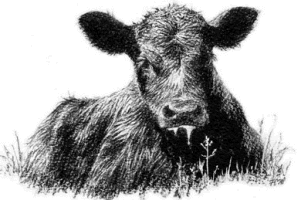

To send a message to an author, click on the author's name at the end of the article.
This Month in Ag Connection | Ag Connection - Other Issues Online
This is the time of year many farmers are working on financial records and preparing for filing taxes. There are many reasons to keep financial records and the most important is for individual use.
Good financial records are important to making informed farm business decisions. Financial records begin with farm records and accounting information. There are many types of farm records with various features. MU Extension has a website with several choices https://tinyurl.com/MU-ABP-records.
When considering changing accounting systems or researching the best features, it is important to consider how the records will be used. Each accounting system has features and limitations and of course a price tag.
Most record systems are computer based, but there are still paper record books that work well. The key is to use a system that is easy for the person entering data. MU Extension has a paper record book, Missouri Farm Tax Record Book (commonly referred to as the blue book), which is available through most County Extension offices. It contains receipts and expenditures forms. Another paper option is the Missouri Farm Business Record Book, (commonly referred to as the red book), developed by University Extension and Ag Education. It contains receipts, expenditures, summary, and enterprise forms needed for one year of records. Refill pages are available and can be printed from the above website and some County Extension offices have yearly refill packets for sale for about $40 to $50. Both may be purchased through the website listed above.
Computer software programs are another choice for farm financial record keeping. There are basically two types of programs: 1) programs designed specifically for farm accounting and 2) generic programs designed for accounting.
Farm accounting packages
The website above lists a software package called PC Mars, which was designed by a company in Iowa and is available through the Iowa Farm Business Center. In addition to financial records this program includes inventory tracking, livestock and crop production data, and enterprise allocations.
Other popular farm accounting software not listed on that webpage includes Easy Farm, UltraFarm, and FarmWorks. These are a few of the popular farm accounting packages. A web search can find the company sites for these accounting packages. Many of the packages have free demo programs, so potential buyers can try the software before purchasing.
Most of the farm specific software companies can easily be reached for help via phone or email.
Generic accounting packages
The website above lists a couple of popular software packages. The website mentions tools and resources to help make these packages easier to use for farm accounting.
There are several choices in accounting systems, so it may be helpful to make a list of the features wanted in a package before searching. It is important to choose a system that makes the task of entering records user-friendly to facilitate keeping records current. Farm accounting is an important foundation of each farm business, so time spent researching accounting software can be very beneficial.
Source: Mary Sobba, Ag Business Specialist
This Month in Ag Connection | Ag Connection - Other Issues Online

The Northeast Missouri Show-Me-Select Replacement heifer sale averaged $2,471 at F & T Livestock Market, Saturday, December 10.
The 16 producers of the 276 heifers were enrolled in the MU educational heifer management program. The heifers were bred to sires with both calving-ease and growth genetics. The top lot sold belonged to Prairie View Farms, Monroe City and brought $3,800.
The highest average price from a consignor was $2,980 on twenty head from long-time consignor Prairie View Farms, Monroe City. Other top consignors were McCutchan Angus, Monticello, $2,750 on 6 head; Keithley/Jackson, Frankford, $2,710 on 24 head and Galaxy Beef, Macon, $2,657 on 33 head.
The 47 buyers were responsible for just over $682,050 worth of bred heifers exchanging hands in one and a half hours. Twenty-nine repeat buyers purchased 178 head, or 64 percent of the total consignment. Calving surveys returned by these buyers provide important information that is given back to consignors to improve for future years.
The Show-Me-Select heifer development program takes nearly a year to complete. The heifers complete a pre-breeding examination usually four to eight weeks before breeding. This exam includes a pelvic measurement, reproductive tract score, and weight. Heifers may be bred artificially or be exposed to natural service, however; the service sires must meet specific calving ease Expected Progeny Difference (EPD) requirements based on breed. This year 155 head, or 56 percent, of the heifers in the sale were synchronized and bred by artificial insemination (AI). In this sale, the choice to AI showed a $98 price advantage over those bred naturally.
All heifers must be pregnancy tested within 90 days of breeding by a veterinarian to determine expected calving date. The use of ultrasound has helped many of the veterinarians improve their accuracies on calving dates. During the development period all heifers undergo an extensive health program and are vaccinated at weaning, pre-breeding, and pregnancy examination as well as treated several times for internal and external parasites. Heifers are also screened for blemishes, condition, muscling and structural soundness by MU livestock specialists and USDA graders.
Averages of other Show-Me-Select sales from fall 2022 were Joplin, $2,093 on 152 head; Kirksville, $2,080 on 111 head; Kingsville, $2,234 on 159 head; SEMO, $2,638 on 54 head; and Farmington, $2,071 on 99 head.
This was the 26th year for the Show-Me-Select heifer sale in Palmyra and over 45,066 heifers have been through the program and 7,974 head have been sold. If you are interested in participating contact your local MU Extension livestock specialist.
Source: Daniel Mallory, Livestock Specialist
This Month in Ag Connection | Ag Connection - Other Issues Online
Pesticides are chemicals designed to kill or repel living things that are considered by humans to be pests. Pesticides include insecticides, herbicides, rodenticides and fungicides. If not handled properly, pesticides may cause harm to other organisms including pets, livestock, wildlife, and people.
Exposure to pesticides can occur through ingestion, inhalation, or skin absorption. Physical responses to pesticide exposure depend on the pesticide, amount of exposure, the age, and the over-all physical condition of the victim. The following safe handling recommendations reduce the likelihood of accidental exposure.
For more information refer to these MU Guides:
Submitted by: Valerie Tate, Agronomy Specialist
This Month in Ag Connection | Ag Connection - Other Issues Online
Add legumes to fescue and other cool-season pastures at the right time to add pounds and profits to cattle. The right time is when pastures are frozen and snowcovered. Snow makes the seeds easier to see. Seeding on frozen ground also lessens the chance of rutting or compacting soils.
Broadcast annual lespedeza, red clover or white clover in mid-February in most of Missouri and late February in northern counties.
Frost seeding, a method of broadcasting seeds, allows seeds to work into the soil as the ground freezes and thaws. Too much thatch or plant residue can prevent good seed-to-soil contact, which reduces stands. Cattle can help by "hoofing" seeds into the soil as they trample pastures.
Red clover, white clover and annual lespedeza are the top three legumes to frost seed in Missouri.
In endophyte-infected tall fescue pastures, clover reduces animal exposure to toxins associated with fescue toxicosis, says Tim Evans, MU Extension specialist in veterinary toxicology.
Fescue toxicosis impairs weight gain, milk production and reproductive performance. It also hinders beef cattle's ability to regulate body heat and causes leg and foot problems, including fescue foot.
Other legume options include alfalfa, birdsfoot trefoil, hairy vetch and sunn hemp. Seed these later in the year; if seeded too early, seeds may germinate and emerge before an ice storm. MU State forage specialist Craig Roberts does not recommend frost seeding birdsfoot trefoil because of its poor vigor in Missouri soils.
The right amount and type of seed and good pasture management determine the success of adding legumes to pastures. Look for "certified seed" for best results and to avoid poor-quality stands. For seeding rates, download the free MU Extension publication "Seeding Rates, Dates and Depths for Common Missouri Forages" at extension.missouri.edu/p/G4652.
In March, the Alliance for Grassland Renewal will offer training in Missouri, Virginia and Alabama. The Missouri training is March 23 at MU's Southwest Research Center in Mount Vernon. Register at https://tinyurl.com/Fescue23. The workshop is a great way to learn to renovate and manage Kentucky 31 fescue pastures. For more information, visit www.grasslandrenewal.org.
Source: MU Extension cooperative media
This Month in Ag Connection | Ag Connection - Other Issues Online
The following list is for in-person training. Pre-registration is required with limited seating. To register call the county extension center or the number listed.
For questions call Valerie Tate (660)-985-5123.
Audrain County - Feb. 27 @ 6 p.m.
Courthouse Basement. To register call 573-581-3231
Boone County - Feb. 27 @ 6 p.m.
Courthouse Basement. To register call 573-581-3231
Carroll County - Feb. 15 @ 10 a.m. or 2 p.m.
Carrollton Public Library
Linn County - Feb. 9 @ 2 p.m. or 6 p.m.
Forage Systems Research Center 660-895-5123
Livingston County - Feb. 8 @ 10 a.m.
Mildred Litton Community Building
Mercer County - Feb. 8 @ 2 p.m.
MU Extension office
Pike County - Feb. 23 @ 6 p.m.
Pike County Fairgrounds. To register call 573-324-5464
Putnam County - Feb. 2 @ 2 p.m.
4-H Building at the Park
Schuyler County - Feb. 7 @ 10 a.m. or 2 p.m.
Assembly Room, Courthouse basement
Sullivan County - Feb. 2 @ 10 a.m.
City Hall Community Room

Publishing Information
Ag Connection is published monthly for Northeast and Central areas of Missouri producers and is supported by the University of Missouri Extension, the Missouri Agricultural Experiment Station, and the MU College of Agriculture, Food and Natural Resources. Managing Editor: Mary Sobba.